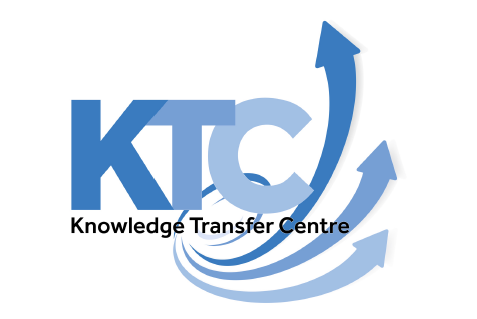Carol McAnally, Priti Purohit and I recently wrote this blog piece as part of a series about the Royal Society Entrepreneur in Residence Programme for the internal university research newsletter, it proved very popular so we wanted to share again here as it has relevance for an external audience and perhaps serves as an update on KTC activities in lieu of a website refresh.
The Knowledge Transfer Centre (KTC) is part of the Commercial Function and supports knowledge exchange (KE), commercialisation and commercial projects at the University. We work with internal and external partners to maximise the socio-economic potential of the University’s property portfolio, academic know-how and research outputs, including intellectual property, to benefit the University and our wider business and community stakeholders.

The University has a strong track record in successful Knowledge Transfer Partnerships (KTPs) – projects that enable business to access academic expertise and work with a graduate – and made the strategic decision to build on this strong base to maximise the new opportunities arising from the launch of the Industrial Strategy in 2017. The KTC team was expanded, and our purpose is to drive engagement with business, bringing people together and connecting across the University. Specialist roles have been brought in as new posts, including a Business Network and Projects Co-ordinator, and a KTP Co-ordinator, and by bringing in an existing Intellectual Property Manager, to reflect the need for a healthy pipeline of innovation opportunities and focus on commercialisation. Together our team:
- Provides advice and support for identification, protection and clearance of IP and potential routes for commercialisation.
- Provides professional KE and commercialisation support for relationship building across academia and business, including stakeholder engagement.
- Brings people together at both the project level, and as part of a larger network, by understanding the needs of our partners, facilitating discussions to support ideation and knowledge sharing, and driving projects forward.
- Enables access to a breadth of knowledge, experience and grant-writing skills that enables our partners to access and secure innovation funding. The team raises awareness and disseminates information on public and private sources of funding, sign-posting relevant opportunities. The team can manage the lifecycle of a project from proposal design to post-award project management.
- Promotes business engagement opportunities to all, and acts as an amplifier for academics when showcasing their knowledge and expertise to a business and wider stakeholder audience.
Knowledge exchange and commercialisation is not an exact science, the role of the team is to add value through supporting innovative ways to overcome barriers and solve practical problems, which often involves working with professionals outside the University. A great example of this is the opportunity to work with the Royal Society Entrepreneur in Residence, Prof Bill Kilgallon currently working with the School of Chemistry, Food and Pharmacy, Bill will bring a different perspective and challenge our current way of thinking, and will support us to investigate commercialisation opportunities of key projects and enable the development of a commercialisation roadmap which can be applied more widely.
Other activities and opportunities from the Commercial Function include:
- Supporting strategic development of the Thames Valley Science Park (TVSP), the University’s business campus, and its role in helping to establish the University as an anchor institution in the region, and further grow the opportunities for knowledge exchange.
- Knowledge Exchange and Commercialisation skills training for academics and students – including an ideas generation training programme (‘pre-accelerator’) to grow the pipeline of projects with the potential for commercialisation and developing a fast-track commercialisation programme that takes ideas towards potential markets (‘accelerator programme’).
- Business networks – the KTC can help support the growth of more business networks and sharing best practice in managing a business network e.g. TVAI Hub, DTPs, CTPs enabling sharing of ideas, raising awareness of opportunities and raising your profile.
- Facilitating local growth and regeneration activities, drawing on our deep understanding of the commonalities between business and community engagement in this context.
If you are interested in engaging our support from please contact the KTC.



 About the application process to Henley Business Angels, Founder and CEO of
About the application process to Henley Business Angels, Founder and CEO of 